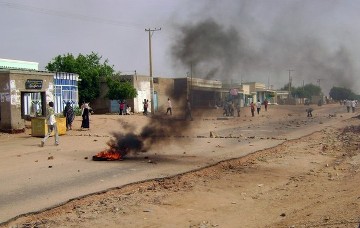Nyala “massacre” draws ire of Sudanese opposition as death toll reportedly rises to 12
August 1, 2012 (KHARTOUM) – A number of Sudanese opposition and civil society groups have strongly chided the authorities for killing peaceful protesters in Darfur’s southern town of Nyala, calling for an immediate probe into the tragic incidents.

Nyala’s protest is the latest and most violent episode of anti-regime demonstrations that have been occurring intermittently around the country since 16 June in response to worsening economic conditions created by the government’s implementation of austerity plans aimed at covering a budget deficit of 2.4 billion US dollars due to the secession of the oil-rich South Sudan.
The Darfur Bar Association (DBA), an activist group of lawyers from Darfur, said on Wednesday that the death toll from the incidents had risen to 13 while those injured number over a hundred.
The DBA strongly criticized security authorities saying they had set a dangerous precedent by firing live bullets on young students and during the holy month of Ramadan. The group further denounced what it called the regime’s violent crackdown on legitimate expressions of discontent against price rises and corruption, adding that the regime’s behavior in Nyala adds to its record of gross violations.
Similarly, the opposition Sudanese Communist Party (SCP) said on Wednesday that Nyala’s events had debunked the regime’s propaganda about guaranteeing freedom of expression and peaceful demonstration while its security forces continue to over-suppress dissent in every possible way.
According to SCP, the Nyala incidents are evidence of the fact that the regime has no qualms about killing people to stay in power. The opposition party said that firing live bullets on peaceful protesters was a “crime against humanity” and called for an immediate and independent investigation in order to serve justice.
Additionally, the leading member of the Democratic Unionist Party (DUP), Hatim Al-Sir, condemned what he termed as the miserable repressive approach with which Nyala protests had been met, calling for sacking all those responsible for the crisis and bringing them to trial no matter their positions.
“There’s not a single reason that justifies spilling the blood of students and protesters with this foolish savagery” he stated.
Al-Sir warned that Sudanese people have been more than patient with the regime but what happened in Nyala is beyond expression.
The DUP figure called on security authorities to immediately release all those detained during recent demonstrations, saying that keeping them is a clear violation of the law and the constitution.
Sudan Democracy First Group, (SDFG), a civil society organization, on Wednesday issued a statement denouncing the “massacre” that the security apparatus of the ruling National Congress Party has committed against Nyala’s citizens.
The group went on to call for the inclusion of the Nayala massacre in the proceedings of the International Criminal Court (ICC) in Darfur, citing the lack of an independent judiciary and prevalence of the impunity culture in the country.
SDFG concluded by calling for work to topple the “most corrupt, repressive, oppressive and racist regime” in the history of Sudan in order to usher in a future of democratic change and a state based on institutions, peace, accountability and development.
(ST)
